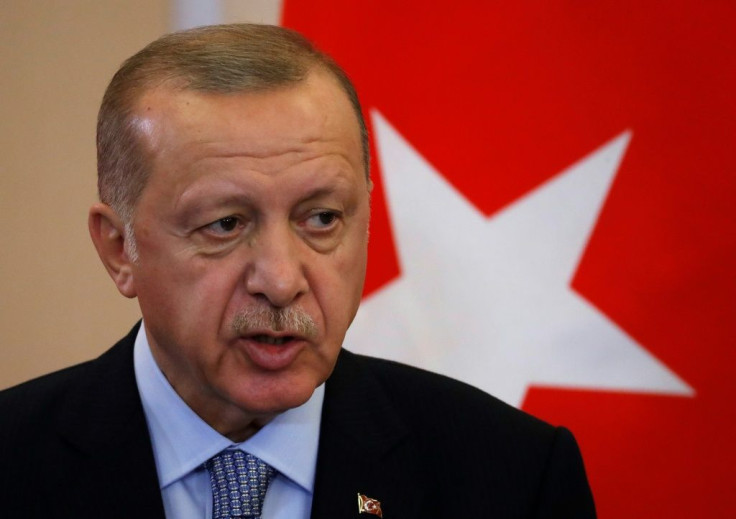Turkish Economy Brightening, President Erdogan Seeks More Investment

Turkey’s President Recep Tayyip Erdogan has called for more investment in his country while asserting that its economy is now on a strong footing.
“We are dispelling the dark clouds over our country by declining our inflation to single-digit figures and rapidly decreasing interest rates. Hopefully, 2020 will be a year in which interest rates will decrease even further,” Erdogan told a group of senior members of his ruling Justice and Development Party on Wednesday. “Come and invest [in Turkey]. I am calling on every industry. Regardless of the sector, come and invest [in Turkey].”
Erdogan noted that investment by domestic entities in Turkey has jumped from 70 billion Turkish Lira ($12.3 billion) annually prior to 2002 to more than 1 trillion Lira ($176 billion) in 2019.
Erdogan boasted that under his regime, his party has been able to wipe out the $23.5 billion debt it owed to the International Monetary Fund.
He also pointed to other improving macroeconomic indicators.
"The increase in housing, automotive, domestic appliance sales, which had contracted due to last year's troubles, as well the rise in the number of newly established companies, is of the indicators of recovery in the economy," Erdogan said.
In addition, he said that while global exports grew by 2.6% in the first nine months of this year, Turkey's exports increased by 2.9%. “Our current account balance now posts a surplus and not a deficit,” he added.
Last week Moody’s forecast that Turkey’s economy will grow by 3% next year.
Moreover, Turkey’s inflation rate has been falling.
In October, the Turkish Statistical Institute said the annualized inflation rate came in at 8.55%, down from 9.26% in September.
Turkey’s Central Bank cut the year-end inflation forecast from 13.9% to 12%. The government targeted lowering the rate further to 8.5% next year, and 6.0% in 2021.
Inflation peaked as high as 25.24% in October 2018.
As for foreign investments into Turkey, Ankara received a big plug from U.S. President Donald Trump.
Last week Trump met with Erdogan at the White House and said Turkey has “enormous potential as a trading partner.” Trump has called for the two countries to reach a target of $100 billion in annual bilateral trade.
U.S. investment in Turkey amounted to $4.7 billion in 2018, a 9% jump over the prior year.
Other countries are also investing in Turkey.
For example, the Turkish wind power industry has attracted much foreign investment interest.
Turkey currently ranks sixth in Europe and 12th in the world in total wind installed capacity.
Jose Luis Blanco Dieguez, CEO of German wind power equipment manufacturer Nordex, said Ankara "successfully conveys the message regarding how it attaches importance to the development of renewable energy. At the end of this year, we will see a new support scheme for investors and we are looking forward to the new program."
Giles Dickson, CEO of European Wind Energy Association, praised Turkey's onshore wind power projects.
“Turkey has carefully designed the legal framework on the wind energy sector,” he said. “Those investors who want to participate in Turkey's first offshore wind farm project are waiting for the release of the legal framework."
Taiwan plans to invest in a steel factory in Kocaeli province in northwestern Turkey.
Walter Yeh, the president of Taiwan External Trade Development Council, said a Taiwanese company is holding talks with Turkish partners to invest $100 million in a steel plant
Yeh added that Taiwan seeks to increase its trading volume with Turkey to $2 billion.
Last year, Taiwan Cement Corp. acquired 40% of OYAK Cement for $640 million. It ranked as the biggest foreign direct investment project in Turkey in 2018.
However, Turkey’s proximity to war-torn Syria has scared off some foreign investors.
Volkswagen AG of Germany canceled plans to construct its first factory in Turkey due to Erdogan’s war against Kurdish militants in Syria.
“As long as people are being killed, we are not laying the foundation stone next to a battlefield,” Chairman Herbert Diess said. “With its large market and good industrial base, Turkey is a very suitable production location for us. However, we are convinced that if businesses think that international law and human rights are the sole responsibility of governments, the market economy loses its ethical foundation.”
Overall, investment in Turkey has fallen since a failed military coup in 2016.
The Economic Policy Research Foundation of Turkey reported that Turkey received $3.1 billion in foreign direct investment in the first half of 2019, an increase of $188 million from the same period as last year.
The largest foreign direct investors were Qatar with 19.4%, followed by the U.K., 18.7%, and Azerbaijan, 17.5%.
© Copyright IBTimes 2025. All rights reserved.




















